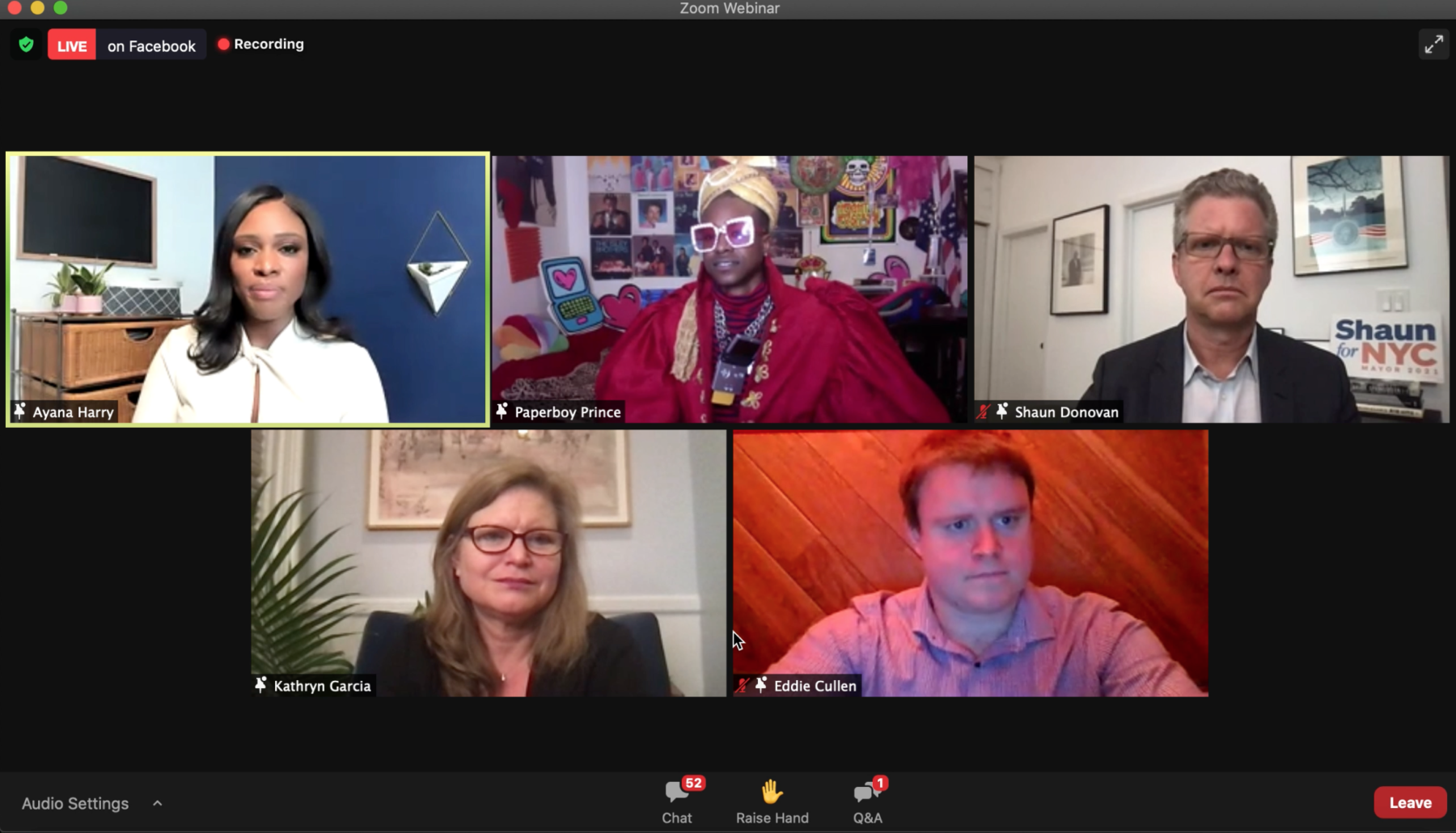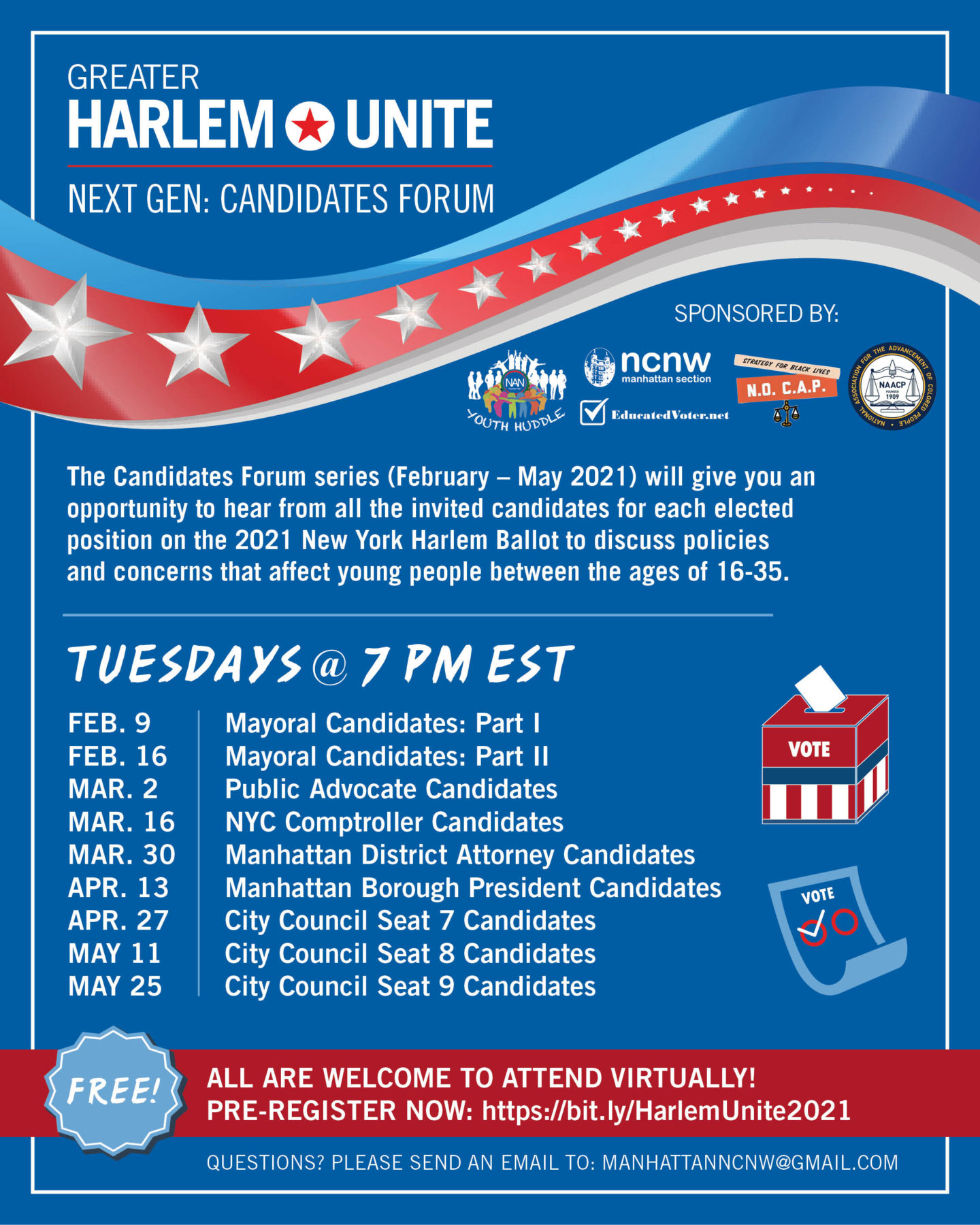As New York City gears up for another pivotal election season, youth leaders in Harlem are working to prepare younger voters for the June 22 city primaries. Starting with two virtual meetings held in February, The Greater Harlem Unite coalition hosted 20 of the 30-plus candidates running for mayor of New York City. At the meetings, part of the coalition’s “Next Gen Candidate Forum” series, the candidates addressed issues local constituents have said are most pressing to them, including pandemic response, police reform, climate justice and public housing.
“[The forums] are meant for the next gen, 16 to 45, to have a better understanding of the people who are running in this municipal election,” said Nia Alvarez-Mapp, social action chair at National Council for Negro Women and lead organizer of the series.
The forums, which were livestreamed on Zoom, Facebook and Pix 11 News, aimed to send a message to the candidates that younger voters are engaged and expect their concerns to be heeded. “Make no mistake. This is a job interview,” Alvarez-Mapp told the 13 candidates who appeared at the first forum on Feb. 9, which drew more than 7,000 viewers.

Coalition leaders hope the series will make up for the lack of civic education among young voters and will harness the energy of last November’s presidential election. According to Tufts’ Center for Information and Research on Civic Learning and Engagement, 52%-55% of voters ages 18 to 29 cast a ballot in the 2020 presidential election, a significant jump from 2016 when the same group turned out at 42%-44%.
If young voters in New York can ride that momentum, “this will be the first year the youth vote will actually have a huge dent in whoever becomes mayor,” said Alvarez-Mapp. In the wake of the largely youth-led protests calling for police reform after the murder of George Floyd, the potential for youth engagement in local elections is higher than ever. “Whoever is the leader has to be prepared that the city is changing,” said Alvarez-Mapp.
At both forums, candidates agreed in broad strokes about the need for more equitable vaccine rollout, improved public housing and police reform and offered a range of plans for how to accomplish change. “Do you support defunding the police?” some candidates were asked. Former nonprofit executive Dianne Morales and City Council member Carlos Menchaca, both Democrats, each responded “yes” and called for new public safety officers pulled from the communities they serve.
Accountant Quanda Francis, and businessman Ray McGuire, also Democrats, responded “no,” to the defunding question but said that they object to the slogan “defund the police” more than to actual proposals to shift some current policing duties and resources to other agencies. Francis promised to cut the New York Police Department’s budget by 27%, and McGuire expressed his support for reallocating funding to community organizations.
Taxi and bodega worker advocate, Fernando Mateo, the only Republican to attend the forums, called for granting more money to the police department to ensure they have “the resources to keep our city safe.” Rapper Paperboy Prince, a Democrat, uniquely called for abolishing police altogether and replacing them with what they called a “love team.”
Candidates discussed pandemic response on multiple fronts, including the need to address learning loss for young children. They all agreed that public schools need more resources, and New York City Comptroller and Democratic candidate Scott Stringer decried inequitable internet access for children learning online.
Candidates generally concurred that restaurants need support to reopen and that New York’s vaccine rollout has been a failure. According to the city’s vaccine tracker, the fully vaccinated rate among residents in predominantly white neighborhoods like the Upper East Side, Lenox Hill, and Yorkville is about 15%. The rate is 4.7% among residents of the predominantly black and brown neighborhoods that are home to the target audience of the forums, including Morningside Heights, Manhattanville, Harlem, Hamilton Heights, Mott Haven, Concourse, and Melrose.
When asked to assess the vaccine rollout, Democrat Shaun Donovan, the former Secretary of Housing and Urban Development in the Obama administration, gave the city an “R” grade for “racist.”

Though the forums were not meant to be debates, friction sparked at times among the candidates. Vitaly Filipchenko, who is running as an Independent, claimed his opponents don’t understand the challenges New Yorkers are facing the way he does as the immigrant owner of a small moving company. Attorney Aaron Foldenaur, a Democrat, accused civil rights activist Maya Wiley, also a Democrat, of using her position as Mayor Bill de Blasio’s counsel to land a “cushy” job at the New School, prompting Wiley’s long-time colleague and fellow candidate, retired Army brigadier general and former head of the city’s Department of Veterans’ Services, Loree Sutton, to scold Foldenauer for being “out of line.”
The Next Gen Candidates Forum series also aims to educate voters on the new rank-choice voting process. During the Feb. 16 forum, Nicole Yearwood from Educated Voter gave a short lecture on the history and process of rank-choice voting in New York, the primary purpose of which is to avoid split votes and run-off elections.
The new system allows voters to select multiple candidates in the order of their preference. If a voter’s first-choice candidate is eliminated in the first round of vote counting, their second-choice votes are distributed to the remaining candidates. Alvarez-Mapp posited that this system circumvents the “either/or” choice between voting one’s conscience or voting for the candidate predicted to win, which has deterred people from voting in the past. “With rank-choice voting, you don’t really have that problem,” she said.
In the months leading up to the June primaries, the coalition – which includes the National Council for Negro Women, the New York branch of the NAACP, the National Action Network Youth Huddle, Strategy for Black Lives, and Educated Voter – will host events featuring candidates for Manhattan District Attorney, Comptroller, Public Advocate and City Council elections for District 7 (Manhattanville, Morningside Heights, Hamilton Heights), District 8 (El Bario, parts of East Harlem, Mott Haven, High Bridge, Concourse, Longwood, Port Morris, and District 9 (Central Harlem, parts of Morningside Heights, parts of the Upper West Side, parts of East Harlem).
“The main focus of this coalition is getting the information out in an equitable way,” said Jerrell Gray of Strategy for Black Lives. “Because honestly, at the end of the day we want the best person to come run our city and run for the people, especially when we’re going through some trying times.”
About the author(s)
Persis Rao is a journalist pursuing a master's degree at Columbia Journalism School where she is on the Visual Craft track. Originally from New Jersey, she received her bachelor's degree from Barnard College where she studied sociology and human rights. She is interested in multimedia reporting on politics, local activism and climate. She can be reached at:
pzr2102@columbia.edu
Twitter: @PersisRao
Instagram: @praophotography



